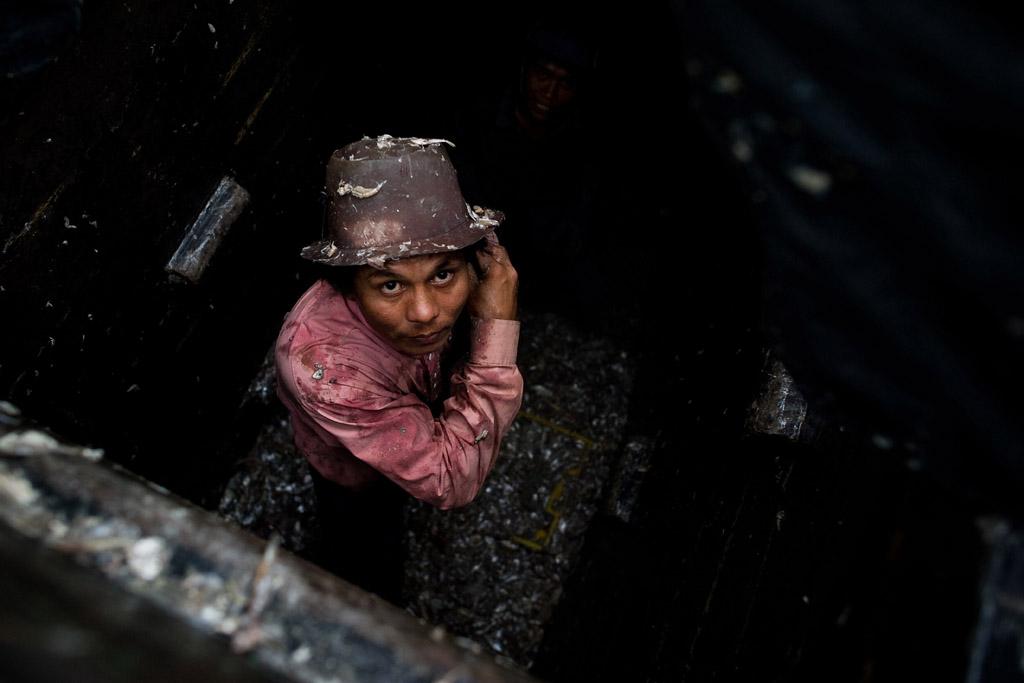Thailand considered sourcing your fish dinner with prison labor
A migrant laborer at work on a Thai fishing boat in Sattahip, Thailand's Rayong province, Sept. 1, 2011.
BANGKOK, Thailand — Trawling the ocean on a Thai fishing boat is one of Asia’s foulest jobs.
It can involve 20-hour work days on a reeking boat, bobbing on lawless seas, under captains who lord over crews like slave drivers. The job attracts so few takers that fishing syndicates infamously rely on forced labor: duping migrants onto ships and forcing them to toil for no pay.
It’s little wonder that Thailand’s fishing industry — a top supplier to the US — struggles to attract workers under such grim conditions.
But officials in Thailand’s military government have a novel solution to this labor shortage.
Prisoners.
Under a pilot project that was abruptly scrapped on Jan. 20, Thai inmates were going to be cleared to serve out sentences on fishing boats. The government had pitched this as a two birds, one stone deal: space is freed up in crowded prisons while boat captains score some desperately needed cheap labor.
But it’s an astoundingly terrible idea, according to a statement from America’s top labor union (AFL-CIO), Human Rights Watch and more than 40 other organizations focused on rights and trade. This mass outcry appears to have prodded Thai officials into killing the idea.
“The situation on these fishing fleets is appalling,” said Phil Robertson, deputy director of Human Rights Watch’s Asia division. “We see everything from physical abuse, 20-hour work days to even killings by senior crew members and captains. That’s not an appropriate place for anyone let alone a prisoner … they’d be defenseless to resist pressures from these captains.”
Adding criminals to Thailand’s seafood supply chain would likely create ripples that reach US supermarkets.
Thailand is America’s second-largest supplier of seafood. Its cheap labor (and even forced labor) help explain why shrimp has gone from expensive delicacy in America to a bottomless buffet item.
Thai-exported seafood, a $7 billion industry, is already mired in scandal. A string of damning investigations — previously by GlobalPost, more recently by The Guardian — have illuminated a nasty underground trade.
Some fish served in the US is originally hauled from the sea by captives toiling under conditions straight out of the 1800s. Poor men from Myanmar and Cambodia are bought like livestock at $650 per head. One escaped slave described to GlobalPost the murder of a fellow fisherman who was stabbed with a spike, shoved into a sleeping bag and dumped into the ocean.
In 2014, after years of issuing waivers, the US finally kicked Thailand down to its lowest human trafficking grade. To claw its way back, Thailand is now promising harsher punishments against traffickers and even GPS trackers to help monitor far-flung boats.
But plans to place inmates on fishing boats is “a truly bad idea that goes in the exact opposite direction towards ending the human trafficking era,” Robertson said. “If they continue to go forward, they’ll have to answer to the Walmarts, Tescos and Carrefours of the world that source Thai seafood.”
Thailand’s Ministry of Labor, which conceived the plan, insisted in a Facebook post that officials were “simply giving Thai people jobs” and not intending "to violate rights."
If the inmates-on-boats idea is ever revived, prisoners might be wise to resist.
As multiple men who’d escaped from slavery on Thai fishing boats explained to GlobalPost, cruelty is routine on trawlers. In a common tale of captain-on-crew brutality, a Cambodian now in his late 20s recalled seeing a fellow captive who couldn’t understand orders get “clubbed with an iron bar.”
“His arm snapped. There was blood everywhere,” he said. “He just went back to sorting fish. It was either keep working or get shot.”
Every day, reporters and producers at The World are hard at work bringing you human-centered news from across the globe. But we can’t do it without you. We need your support to ensure we can continue this work for another year.
Make a gift today, and you’ll help us unlock a matching gift of $67,000!
